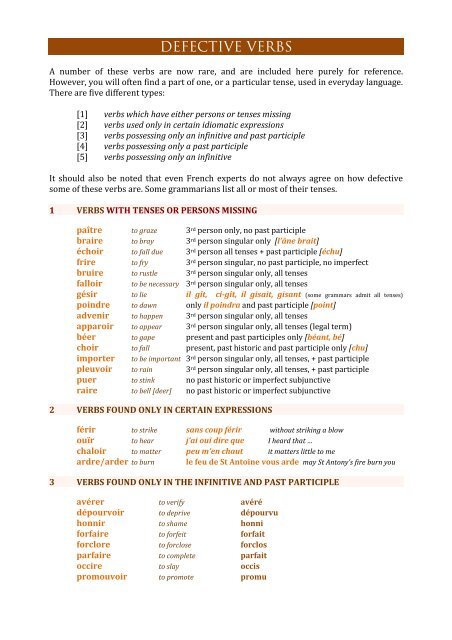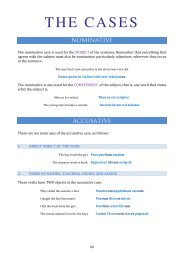Microsoft Word – FGB§2 verbs
Microsoft Word – FGB§2 verbs
Microsoft Word – FGB§2 verbs
You also want an ePaper? Increase the reach of your titles
YUMPU automatically turns print PDFs into web optimized ePapers that Google loves.
DEFECTIVE VERBS<br />
A number of these <strong>verbs</strong> are now rare, and are included here purely for reference.<br />
However, you will often find a part of one, or a particular tense, used in everyday language.<br />
There are five different types:<br />
[1] <strong>verbs</strong> which have either persons or tenses missing<br />
[2] <strong>verbs</strong> used only in certain idiomatic expressions<br />
[3] <strong>verbs</strong> possessing only an infinitive and past participle<br />
[4] <strong>verbs</strong> possessing only a past participle<br />
[5] <strong>verbs</strong> possessing only an infinitive<br />
It should also be noted that even French experts do not always agree on how defective<br />
some of these <strong>verbs</strong> are. Some grammarians list all or most of their tenses.<br />
1 VERBS WITH TENSES OR PERSONS MISSING<br />
paître to graze 3 rd person only, no past participle<br />
braire to bray 3 rd person singular only [l’âne brait]<br />
échoir to fall due 3 rd person all tenses + past participle [échu]<br />
frire to fry 3 rd person singular, no past participle, no imperfect<br />
bruire to rustle 3 rd person singular only, all tenses<br />
falloir to be necessary 3 rd person singular only, all tenses<br />
gésir to lie il gît, ci-gît, il gisait, gisant (some grammars admit all tenses)<br />
poindre to dawn only il poindra and past participle [point]<br />
advenir to happen 3 rd person singular only, all tenses<br />
apparoir to appear 3 rd person singular only, all tenses (legal term)<br />
béer to gape present and past participles only [béant, bé]<br />
choir to fall present, past historic and past participle only [chu]<br />
importer to be important 3 rd person singular only, all tenses, + past participle<br />
pleuvoir to rain 3 rd person singular only, all tenses, + past participle<br />
puer to stink no past historic or imperfect subjunctive<br />
raire to bell [deer] no past historic or imperfect subjunctive<br />
2 VERBS FOUND ONLY IN CERTAIN EXPRESSIONS<br />
férir to strike sans coup férir without striking a blow<br />
ouïr to hear j’ai ouï dire que I heard that …<br />
chaloir to matter peu m’en chaut it matters little to me<br />
ardre/arder to burn le feu de St Antoine vous arde may St Antony’s fire burn you<br />
3 VERBS FOUND ONLY IN THE INFINITIVE AND PAST PARTICIPLE<br />
avérer to verify avéré<br />
dépourvoir to deprive dépourvu<br />
honnir to shame honni<br />
forfaire to forfeit forfait<br />
forclore to forclose forclos<br />
parfaire to complete parfait<br />
occire to slay occis<br />
promouvoir to promote promu



